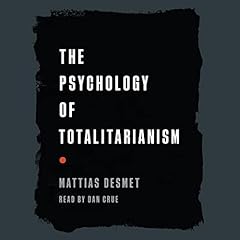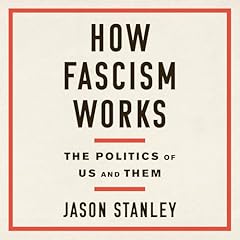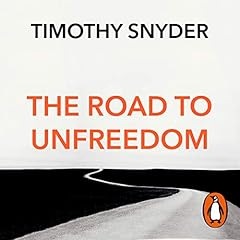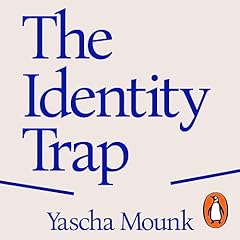
The Origins of Totalitarianism
Failed to add items
Add to basket failed.
Add to wishlist failed.
Remove from wishlist failed.
Adding to library failed
Follow podcast failed
Unfollow podcast failed
Buy Now for £29.99
No valid payment method on file.
We are sorry. We are not allowed to sell this product with the selected payment method
-
Narrated by:
-
Nadia May
-
By:
-
Hannah Arendt
About this listen
A recognized classic and definitive account of its subject, The Origins of Totalitarianism traces the emergence of modern racism as an "ideological weapon for imperialism," begining with the rise of anti-Semitism in Europe in the nineteenth century and continuing through the New Imperialism period from 1884 to World War I.
In her analysis of the institutions and operations of totalitarian movements, Arendt focuses on the two genuine forms of totalitarian government in the twentieth century: Nazi Germany and Stalinist Russia, which she adroitly recognizes as two sides of the same coin rather than opposing philosophies of the Right and Left. From this vantage point, she discusses the transformation of classes into masses, the role of propaganda, and the use of terror essential to this form of government. In her brilliant concluding chapter, she discusses the nature of individual isolation and loneliness as preconditions for total domination.
©1966 Hannah Arendt (P)2007 Blackstone Audio, Inc.What listeners say about The Origins of Totalitarianism
Average customer ratingsReviews - Please select the tabs below to change the source of reviews.
-
Overall5 out of 5 stars
-
Performance5 out of 5 stars
-
Story5 out of 5 stars
- Amazon Customer
- 12-07-22
A must to understand history
It beats the propaganda we are force fed on. If we can only learn that there are no monster just inadequate human beings.
Something went wrong. Please try again in a few minutes.
You voted on this review!
You reported this review!
-
Overall4 out of 5 stars
-
Performance4 out of 5 stars
-
Story4 out of 5 stars
- Ed
- 16-05-17
Hard but interesting
Very thorough treatment of the subject that requires attention & concentration but well worth it
Something went wrong. Please try again in a few minutes.
You voted on this review!
You reported this review!
5 people found this helpful
-
Overall5 out of 5 stars
- Terence Alan Browning
- 02-06-19
Lengthy, but worth the slog.
Why are the Jews the most persecuted and hated minority in Europe?
How did Hitler and Stalin organise their political controls and why did they work so effectively?
What does a prophecy mean in the mouth of a Totalitarian leader?
The parallels with the politics of 2019 are unsettling.
Something went wrong. Please try again in a few minutes.
You voted on this review!
You reported this review!
-
Overall5 out of 5 stars
-
Performance5 out of 5 stars
-
Story5 out of 5 stars
- Terje
- 13-05-14
A must read, for people interested in history.
Would you listen to The Origins of Totalitarianism again? Why?
Hanna Arendt gives us great insight into European history, espesially the period 1800-1950. Why the first generation of educated young Jews, leaves the profession of their parents, and become revolutionaries, and end up in gulags and concentration camps. She also lists the differences and similarities, between Nazi-Germany and Soviet-Union.
What other book might you compare The Origins of Totalitarianism to, and why?
"The Road to Serfdom" by F.A. Hayek
"In the Shadow of Satan" by Janusz Subczyski
What does Nadia May bring to the story that you wouldn’t experience if you had only read the book?
Clear and easy listening.
Was this a book you wanted to listen to all in one sitting?
Yes
Something went wrong. Please try again in a few minutes.
You voted on this review!
You reported this review!
41 people found this helpful
-
Overall3 out of 5 stars
-
Performance4 out of 5 stars
-
Story2 out of 5 stars
- Amazon Customer
- 15-05-17
history through a narrow slit
I was looking forward to listening to this book but found it disappointing. it seemed to me like viewing history through a narrow slit even though it was explained that anti semitism fur example need not just apply to anti semitism and can mean any similarly targetted victims. I'm also unsure about the view that we have never seen such tyranny as we have in contemporary and near contemporary times. I would concede that technology has made tyranny more effective but not that our recent times are necessarily any more tyrannical by intent or purpose.
Something went wrong. Please try again in a few minutes.
You voted on this review!
You reported this review!
1 person found this helpful
-
Overall4 out of 5 stars
-
Performance3 out of 5 stars
-
Story3 out of 5 stars
- Mr A Carroll
- 07-11-17
informative but dull
struggled to finish, but understood there was valuable instead so plowed on.
feel it repeats itself.
Something went wrong. Please try again in a few minutes.
You voted on this review!
You reported this review!
-
Overall5 out of 5 stars
-
Performance5 out of 5 stars
-
Story5 out of 5 stars
- Allan Paterson
- 26-09-20
Excellent history to fast track your understanding
I was directed to this book via Twitter as a good way of understanding both history and where we might be headed in the UK and USA right now. This is a very comprehension lesson and more people should read it and take note.
Something went wrong. Please try again in a few minutes.
You voted on this review!
You reported this review!
-
Overall3 out of 5 stars
-
Performance4 out of 5 stars
-
Story3 out of 5 stars
- Kirstine
- 12-02-18
Style of writing doesn’t suit an audio book
Written just after the second world war, with some later amendments, the book inevitably only considers events up to that point in time. What surprised me was that it was about 15 hours of listening before the totalitarian regimes are discussed in any detail. The first 7 hours or so lays out the history of anti-semitism. Interesting and I’m sure revealing at the time of writing, but is now a familiar topic that has been covered by many authors. As a German Jew I can well understand why the author wanted to expose the injustices but I don’t see the close link between anti-semitism and totalitarianism.
The next 7 hours are about imperialism in great detail. Again, interesting but a well-trodden path by subsequent authors. The final third of the book does deal directly with Nazism and Soviet-style regimes the dominant totalitarian systems of the period. Again now familiar topics with many books written. The final chapter of the book is a strange addition of philosophical musings about aspects of loneliness and sat awkwardly as the finale to the book.
There is interesting material in the book but the style of writing is overly wordy and doesn’t suit being narrated. I skipped a few chapters here and there, such as a lengthly section on the Dreyfus affaire as I’ve read a book about that scandal.
I imagine in the early 1950s this was a ground-breaking book, but its verbose style of writing now seems dated and the material less illuminating. Of historical interest but inevitably omits the more recent regimes with one party dominating and ruling by force.
Something went wrong. Please try again in a few minutes.
You voted on this review!
You reported this review!
5 people found this helpful
-
Overall5 out of 5 stars
-
Performance4 out of 5 stars
-
Story5 out of 5 stars
- D J Hippisley
- 07-08-22
Wow, what a book
This book is an eye-opener and a life changer. Read fairly well. Would like chapter headings! Why are these always missing.
Something went wrong. Please try again in a few minutes.
You voted on this review!
You reported this review!
1 person found this helpful
-
Overall5 out of 5 stars
-
Performance5 out of 5 stars
-
Story5 out of 5 stars
- Katja Kukkasjärvi
- 27-12-21
Lest we should forget.
Essential reading for today's politicians. Hannah Arendt provides a full review of circumstances where populist politicians may be tempted to strive for totalitarianism; and what totalitarianism does to its contemporaries. No soul is spared. The final chapter on the difficulty to grasp (and therefore in some individuals the difficulty to believe in) the experience of concentration camps is chilling. Arendt describes it as an experience beyond life and death. When utter loneliness has been thrust upon individuals on purpose, society becomes fragile and humans capable of committing extreme violence in complete nonchalance.
Something went wrong. Please try again in a few minutes.
You voted on this review!
You reported this review!


















